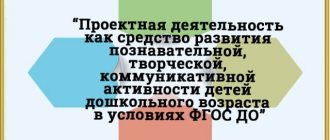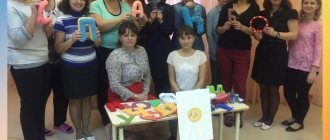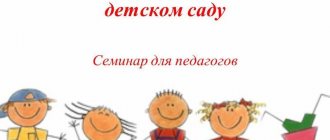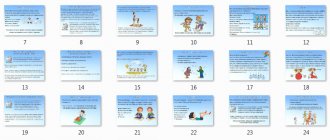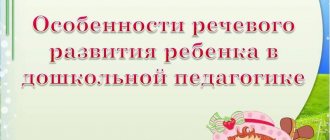Pedagogical activities aimed at the comprehensive development of the child’s personality will be more effective if they are built in accordance with the nature, culture of the child and the teacher.
In the course of pedagogical activity, a special communication arises between the teacher and the child, in which the participants find their own view of the world. The task of pedagogical activity in the context of a dialogue between the cultures of the teacher and the child is twofold: on the one hand, to strengthen and develop the child’s ways of thinking, position, and picture of the world; on the other hand, organize interaction with another culture (an adult).
The leading role of the teacher (adult), organizing the process of raising and educating a child, is quite fully defined in the studies of A.V. Zaporozhets, P.Ya. Galperina, L.A. Wenger et al. S.L. Rubinstein repeatedly emphasized that the pedagogical process shapes the child’s personality to the extent that the teacher guides his activity and does not replace it. Similar conclusions are contained in the works of V.S. Merlina, J. Strelyau, A.B. Nikolaeva, A.V. Petrovsky, R. Burns and others.
The most general task of pedagogical activity in the educational process is to create conditions for the harmonious development of the individual, to prepare the younger generation for work and other forms of participation in the life of society. It is solved by organizing a personally developing environment, managing various activities of students and building correct interaction with the child.
In pedagogical science, there are two types of interaction between teacher and child: subject-object and subject-subject.
1. Subject-object relations. In pedagogical activity, the role of the subject is the teacher, and the role of the object is the student (child).
The teacher as a subject of pedagogical activity is characterized by goal setting, activity, pedagogical self-awareness, adequacy of self-esteem and level of aspirations, etc. In this situation, the child acts as a performer of the requirements and tasks set by the teacher. With reasonable subject-object interaction, the positive qualities of children are formed and consolidated: diligence, discipline, responsibility; The child accumulates experience in acquiring knowledge, masters the system, the orderliness of actions. However, as long as the child is the object of the pedagogical process, i.e., the motivation for activity constantly comes from the teacher, the child’s cognitive development will not be effective. A situation where there is no need to show initiative and limited independence often creates negative aspects of the personality. The teacher “sees” his students in a very one-sided way, mainly from the point of view of compliance/non-compliance with the norms of behavior and the rules of the organized activity.
2. Subject-subject relationships contribute to the development in children of the ability to cooperate, initiative, creativity, and the ability to constructively resolve conflicts.
The most complex work of thought processes and imagination is activated, knowledge is activated, the necessary methods are selected, and various skills are tested. All activities acquire personal significance for the child, valuable manifestations of activity and independence are formed, which, with a sustainable strengthening of the subject position, can become his personal qualities. During subject-subject interaction, the teacher understands his students more personally; such interaction is called personality-oriented. A personality-oriented teacher maximizes the development of the child’s ability to realize his “I” in connections with other people and the world in its diversity, to comprehend his actions, to foresee their consequences, both for others and for himself. Pedagogical activity in this kind of interaction is dialogical in nature. M. Bakhtin believes that a child only in dialogue, entering into interaction with another subject, gets to know himself, through comparison with another, through a comparison of his choice and his own choice.
The nature of the interaction between the teacher and the child determines the style of pedagogical activity. In domestic science, the works of I. V. Strakhov, N. D. Levitov, E. A. Klimov, V. E. Chudnovsky, V. I. Morosanov and others are devoted to the study of this problem.
A.K. Markov differentiates democratic, authoritarian and liberal styles of pedagogical activity and describes them as follows.
With a democratic style of pedagogical activity, the child is considered as an equal partner in communication and cognitive activity. The teacher involves children in decision-making, takes into account their opinions, encourages independent judgment, and takes into account not only academic performance, but also personal qualities. Methods of influence are encouragement to action, advice, request. Teachers with a democratic style of interaction are characterized by greater professional stability and satisfaction with their profession.
With an authoritarian style, the child is viewed as an object of pedagogical influence, and not an equal partner. The teacher makes decisions alone, establishes strict control over the fulfillment of the requirements placed on him, uses his rights without taking into account the situation and opinion of the child, and does not justify his actions to him. As a result, children lose activity or carry it out only when the teacher plays a leading role, and exhibit low self-esteem and aggressiveness. The main methods of influence of this style are orders and teachings. Teachers are characterized by low satisfaction with their profession and professional instability.
With a liberal style, the teacher moves away from making decisions, transferring the initiative to children and colleagues. Organizes and controls the activities of children without a system, shows indecision and hesitation.
Each of these styles, identifying the attitude towards the interaction partner, determines its character: from subordination, following - to partnership and to the absence of directed influence. It is important that each of these styles presupposes the dominance of either monologue or dialogic forms of communication.
Modern forms of interaction between participants in the educational process
Psychological prevention
– this is the promotion of the full socio-psychological, personal, professional development of the child; prevention of possible personal and interpersonal problems of ill-being and socio-psychological conflicts, including the development of recommendations on the part of the teacher to improve the socio-psychological conditions of self-realization, taking into account the socio-economic, cultural-ethnic and other conditions of the child’s life.
Psychological counseling
– this is the provision of assistance to the child by the teacher in self-knowledge, adequate self-esteem, adaptation to real life conditions, the formation of a value-motivational sphere, overcoming crisis situations and achieving emotional stability. All of the above should contribute to continuous personal and psychological growth in self-development.
Psychological correction
– this is the active psychological influence of the teacher on the student’s personality in order to eliminate various deviations in his personal, psychological development in specific socio-psychological conditions of life.
Psychological and pedagogical training technologies
.
Social-psychological training
: business communication training, perceptual training, sensitivity training, family relationships training.
Intellectual trainings
: training for the development of attention and observation, training for flexibility of thinking, training for increasing memory capacity and developing its characteristics, training for the development of creative thinking (creativity).
Organizational trainings
: training for building team (class) cohesion, decision-making training, training for student behavior in extreme situations, training for conflict-free communication in the classroom, training for improving the efficiency and joint activities of students in the classroom.
Self-regulation training
: psychological trainings, auto-trainings, relaxation trainings and biofeedback trainings.
Personal growth trainings
students: dynamic orientation training (psychodrama), social perception training, humanistic orientation training (Gestalt), role training, self-regulation training for the emotional-volitional sphere of students.
Teacher - parent
The conditions of current education have proclaimed parents as subjects of the educational process. This means that parents are also responsible for the quality of their children’s education. Interaction with parents is the main key point in building the educational work of an educational organization. The leading role in organizing cooperation between school and family is assigned to teachers. The interaction between family and school should be based on the principles of mutual trust and respect, support and assistance, patience and tolerance towards each other. In the work of teachers with parents, a significant place is given to psychological and pedagogical education. The accumulation of psychological and pedagogical knowledge of parents should be closely related to the development of their pedagogical thinking, practical skills in the field of education. It is necessary that the information be of a preventive nature, based on practical expediency, and demonstrate experience and specific facts. This determines the selection of content, as well as forms of interaction between participants in the educational process.
Pedagogical communication as a form of interaction between teacher and children
Definition 1
Pedagogical communication is a way of organizing the relationship and interaction between a teacher and children during the implementation of the process of teaching and upbringing, which is focused on creating optimal conditions for cognition and providing an educational impact.
During pedagogical communication, information resources are exchanged and pedagogical relationships are formed between its participants.
The successful achievement of the goals and objectives of education and the professional work of a teacher is largely determined by the level of development of pedagogical communication. it contributes to the formation of a favorable microclimate in classrooms, through the organization of correct relationships between the teacher and children, between the teacher and parents, between teachers and between children in the team.
Are you an expert in this subject area? We invite you to become the author of the Directory Working Conditions
Note 1
The child’s personal development and socialization depend on the quality of pedagogical communication.
During communication, the adult influences the child and the development of relationships between children.
Pedagogical communication is also a personal property of a teacher, reflecting his sociability, ability to build positive relationships between children, as well as his professional quality, focused on organizing the educational process of an individual focus and differentiated nature. In the course of pedagogical communication, conditions are created for the disclosure of the child’s individuality, his exceptional properties and natural potential.
Figure 1. Communication in the pedagogical process. Author24 - online exchange of student work
Finished works on a similar topic
Course work Communication of a teacher with children in the educational process 410 ₽ Abstract Communication of a teacher with children in the educational process 280 ₽ Examination Communication of a teacher with children in the educational process 200 ₽
Receive completed work or specialist advice on your educational project Find out the cost
Pedagogical communication serves as the basis for constructing pedagogical interaction. This interaction has three directions of development:
- Functional-role direction. Communication contributes to the teacher’s direction of children’s activities, its organization and monitoring of the results of its implementation. With such an interaction, the child does not perceive the teacher as a person with whom he can communicate on an equal basis. The teacher acts as a subject of control and regulation.
- Personal direction. During such interaction, direct communication with children occurs, during which the teacher conveys to them his skills, knowledge, and individuality. Such interaction affects the motivational and value sphere of children. This encourages them to learn and develop, to assimilate a system of values and norms of social behavior.
- Complex direction. It involves a combination of control with personal communication i.e. The teacher directs the children’s activities, revealing themselves and their individuality, while controlling the progress of the activity.
The functional role of communication in the educational process
The process of communication in the educational process is an activity focused on developing the communication skills of students and building a system of optimal interaction between children and the teacher.
The process of communication between a teacher and children has important functional significance. It manifests itself in the performance of the following functions in the educational process:
- Informational. During communication, information resources are exchanged between the teacher and students. At the same time, knowledge is transferred not only from the teacher to the students, but also vice versa - the teacher can learn something from the children;
- Community formation. In the process of communication, a sign exchange is realized. It allows you to identify those people who want to communicate and establish positive interactions;
- Regulatory regulation. In the process of communication between the teacher and children, joint activities on training, education and development, assimilation of the educational program are implemented. Communication regulates and controls this activity;
- Cognitive. Communication is a tool of cognition. In its course, the child gets to know himself and the people around him;
- Emotional. During communication, the emotional side of the personality is activated. Communication fills children with positive emotions and motivates them to learn;
- Self-perception. In the process of communication, the individual becomes aware of his “I”, its structure, and understands his place among other people;
- Personal self-determination. In the process of communication, the affirmation of one’s “I” in thoughts and actions is realized. The child learns self-determination and self-affirmation.
Factors and conditions for effective communication in the educational process
In order for pedagogical communication to have a positive effect and contribute to the target achievement of educational activities, it is necessary to take into account a number of factors and conditions for its effective organization. These include:
- Creating a positive microclimate, a friendly atmosphere in the team.
- The content and nature of the appeal to the child, aimed at introducing him to some activity or requirements for its implementation, the formation of behavior, must be individually oriented, tactful and friendly.
- During communication, it is necessary to use non-verbal methods of influence: facial gestures, tactile touches, intonation and tone.
- Creating optimal conditions and environment for joint activities.
- Help and support the child in joint activities and solving educational problems.
- Communication should be emotionally charged and intense.
- Introducing positive factors into a child’s life that strengthen the role of universal human values and moral social behavior.
- Interaction with the child must be voluntary. If it is based on struggle, then it will be ineffective for the educational process.
- The child’s active position in communication.
- Creating conditions to encourage the child to take positive actions and actions, positive communication.
- The teacher must have the skills to listen to the child and understand his emotional state.
- The teacher’s communication style, his cultural development, professional skills and speech characteristics determine the effectiveness of pedagogical communication.
Get paid for your student work
Coursework, abstracts or other works
